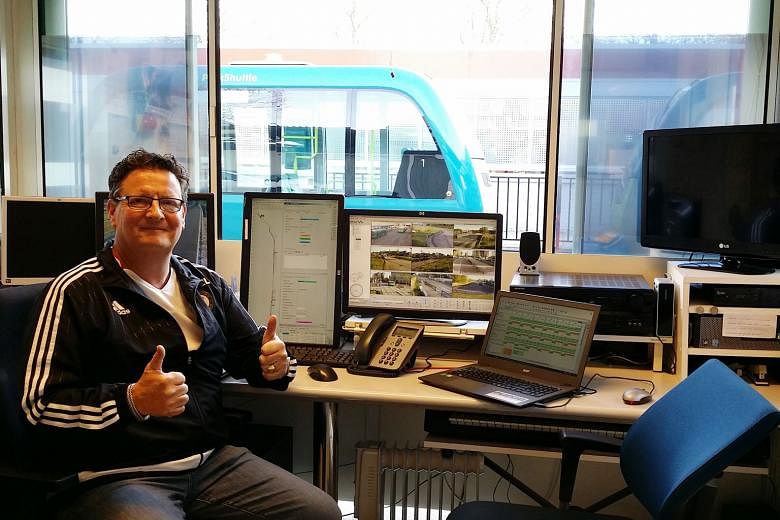A bus driver for 20 years, Dutchman Bram Moelker, 51, now operates six self-driving buses from behind a set of computer monitors.
From a control room in the Rivium Business Park in Rotterdam, the Netherlands, his job is to ensure the smooth running of the electric buses which carry 20 passengers each and ply a 1.8km network within the park.
The buses operate autonomously on a tracked road that is part of a road network used by motorists, cyclists and pedestrians. If he is on the early shift, he starts work at 5.30am, checks the tracks and buses, then dispatches the first three vehicles at 6am, and another three more during the morning peak hours. Mr Moelker says he "takes care of everything", and that includes handling inquiries from passengers who contact him via intercom, plus cleaning and simple maintenance of the vehicles. Every few months, a careless motorist or cyclist might knock into and damage boom barriers - located at the intersection between the driverless buses and regular vehicular traffic - so Mr Moelker will have to fix them or get a contractor to do so. These barriers prevent vehicles driven by humans from getting into the path of the self-driving buses. When the barriers are out of order, the buses will stop operating.
On the very rare occasion that the system cannot recover within 30 minutes, Mr Moelker or his colleagues drive a minibus to ferry passengers.
The driverless buses in Rotterdam were introduced in 2004 to extend the transport network to the Rivium Business Park from a nearby metro system, and cut down walking time for people working there. Mr Moelker chose to leave his job as bus driver to take on the role of operator, saying he jumped at the chance to try something new.
When autonomous buses and taxis eventually take over the roads, say, in 20 to 30 years' time, those who drive for a living will be displaced. US-based consultant Chunka Mui warned on the Forbes blog that the list of jobs affected will not stop at taxi, Uber, bus and lorry drivers but run to "new car dealers, collision and repair shops, tow truck operators, insurance agents, adjustors, call-centre operators, ambulance drivers".

Experts in Singapore agree that driving jobs will inevitably have to go if autonomous vehicles prove to be safer, more reliable and resource efficient. But new jobs will be created assomeone has to monitor these vehicles, says Dr Marcelo Ang, acting director of the National University of Singapore's Advanced Robotics Centre.
"They can be fleet managers but fewer numbers (of workers) may be required. They will do decision- making for extraordinary situations, such as accidents and unexpected scenarios. They could be like the air traffic controllers at airports," he adds.
Mr Robbert Lohmann, vice-president of marketing at 2getthere, the Dutch company behind Rivium's driverless buses, says: "We believe it shifts employment, creating more desk jobs and replacing manual labour...
"It adds to the knowledge economy or, in this case, economic growth. The reliance of Singapore on foreign labour will also become less."
Few locals want to be bus drivers. So operators like SMRT now hire 50 per cent of its bus drivers from countries such as China and Malaysia.
Last month, 2getthere announced a joint venture with SMRT to form 2getthere Asia, with plans to bring its driverless pods to Singapore and the region.
But does technology take away more jobs than it creates? How severe will the labour pains be for transport workers? Associate Professor Randolph Tan, director of the Centre for Applied Research at SIM University, says technological change creates as many, or even more, jobs than it renders obsolete, as happened when economies shifted from agriculture to industry.
"When it occurs too rapidly, the changes have been extremely disruptive for society. But if you look at the net gains over a period of decades after society has had time to adjust, you would find few people arguing for a return to pre-industrialisation standards in jobs and living," says Prof Tan.
Still, driverless technologies can lead to a rise in structural unemployment, when jobless individuals cannot find work due to a mismatch between their skills and those demanded by employers. "Government policy must prepare workers of the future to acquire the skills to perform complementary tasks," says Singapore Management University Economics Professor Hoon Hian Teck, and that is how SkillsFuture can be "a national effort to build a society more resilient towards disruptive technologies".
Experts also say that the negative impact of driverless cars on jobs has to be weighed against the gains to commuters, including groups who now struggle to access public transport. Mr Mui predicts that driverless taxis - which are set to cost less - will spell "freedom, independence and self-reliance for many seniors and people with disabilities". Driverless cars will also reduce the waste in resources spent hunting for carparking space. "Many of the issues that I raised apply to Singapore, and some perhaps more so because of the ageing population and the urban density," he says in a reply to The Straits Times.
Mr Moelker, the bus driver turned operator, says: "The system is easy to learn. (But) some people may find being a controller stressful. You have to make a lot of decisions at the same time. " Observing that there are few driverless systems in the world, he says "being a controller now is something special".
Adrian Lim

